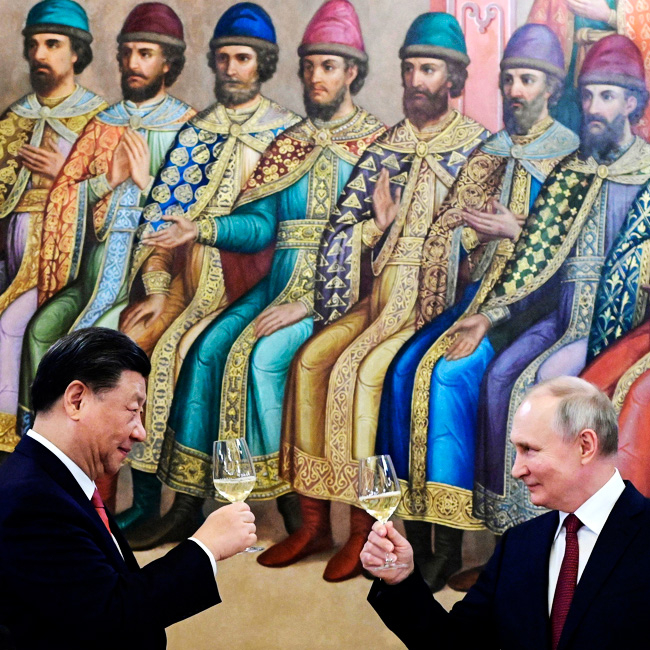“Are you better off now than you were four years ago?” So asked Ronald Reagan in October 1980, in the line that doomed Jimmy Carter’s re-election hopes. Now, as then, large numbers of Americans are inclined to answer “no.” Joe Biden himself is not better off than he was four weeks ago, let alone four years ago, while Donald Trump, having survived an assassination attempt, is better off if only because he is alive.
Supporters of global democracy have even more reason to feel less better off. From Moscow to Pyongyang, Caracas to Harare, anti-democratic strongmen have rarely had it so good, writes Anne Applebaum in Autocracy, Inc. “Shored up by the technologies and tactics they copy from one another, by their common economic interests, and above all by their determination not to give up power, the autocracies believe that they are winning.”
By Applebaum’s count, the ranks of illiberal, quasi-authoritarian states have grown to 50 or more, including Vladimir Putin’s Russia, Xi Jinping’s China, and Iran’s radical-Shia theocracy. Despite vast differences in cultures and ideologies, these autocrats have forged steadily closer economic, political, and military ties, acting “not like a bloc but rather like an agglomeration of companies.” They do have a common enemy: “The democratic world, ‘the West,’ NATO, the European Union”—in other words, “that enemy is us.”
In pursuit of their overriding goal of monopolizing power and wealth for themselves, their families, and their cronies, today’s dictators “will reach for whatever ideology, whatever technology, and whatever emotions might be useful.... Only the purpose never changes: Autocracy, Inc., hopes to rewrite the rules of the international system itself.”
Applebaum’s thesis is familiar to readers of The Atlantic, where she’s a staff writer, and to the government officials, democracy activists, policy wonks, and media figures who frequent the global-conference circuit. (Her husband is Poland’s foreign affairs minister.) Compared to Applebaum’s previous, prizewinning histories of the Soviet era, Autocracy, Inc. is modest in scale. It’s less a work of scholarship than the kind of tightly argued, crisply written policy brief Washington insiders might flip through on their charter flights to Aspen.
From Moscow to Pyongyang, Caracas to Harare, anti-democratic strongmen have rarely had it so good.
It won’t be comfortable reading. Applebaum is unsparing in her criticism of Western elites for enabling the rise of anti-democratic forces. In the decades after the end of the Cold War, U.S. and European leaders talked about promoting democracy and the rule of law in formerly communist countries. Meanwhile, “Western companies and financial institutions were helping build autocracy and lawlessness, and not only in Russia,” making a killing in the process. Pushed by corporate interests, successive U.S. administrations also expanded trade with China, choosing to ignore the ways in which the Chinese Communist Party exploited technological and economic advances to dial up repression and consolidate power.
Applebaum reserves particular contempt for those American leaders who insisted that information technology would help make the world safe for democracy. In one withering passage, she cites a “room full of foreign policy experts” who laughed along with Bill Clinton’s assertion in a 2000 speech that Chinese attempts to control the Internet would be like “trying to nail Jell-O to the wall.” Later, Applebaum settles the score with former New York Times executive editor Max Frankel, who, in a review of one of Applebaum’s earlier books, dismissed her prediction that Putin would eventually use the Internet to his advantage. “So far this century, technology has become a welcome defense against tyranny,” Frankel wrote. Needless to say, that line hasn’t aged well.
By the end of Autocracy, Inc., it’s hard not to be resigned to a future in which sinister forces increasingly dictate events, with the Russian invasion of Ukraine and Hamas’s terrorist attack on Israel foreshadowing the disorder ahead.
Yet Applebaum dedicates her book to “the optimists” and strives to conclude on a brighter note. She lays out a set of achievable, discrete policies to push back against “autocratic behaviors, wherever they are found.” These include boosting financial transparency, cracking down on government corruption, eliminating tax shelters and money laundering, forcing tech companies to limit the spread of disinformation, and reducing dependence on China and Russia for critical resources as well as energy supplies. Though Applebaum concedes that “there is no liberal world order anymore,” she argues that more concerted, coordinated efforts by democratic governments to get their own houses in order would at least give liberals a fighting chance.
That’s the hopeful case. With Xi and Putin deepening their military alliance and the U.S. facing an unprecedented political crisis, it doesn’t require a huge leap to imagine a more dire scenario. Perhaps because much of Autocracy, Inc. was written before the 2024 presidential campaign began in earnest, Applebaum devotes only a few paragraphs to the potential return of Trump. Still, she warns that “if he ever succeeds in directing federal courts and law enforcement at his enemies, in combination with a mass trolling campaign, then the blending of the autocratic and democratic worlds will be complete.” The question left unresolved by this engrossing book is whether America will ultimately confront the autocrats—or sidle up to them.
Romesh Ratnesar is a senior vice president at the Atlantic Council. He was previously a State Department official and a member of the Bloomberg Opinion editorial board


